Whitman_惠特曼_作品_介绍_英文版
草叶集 英文版
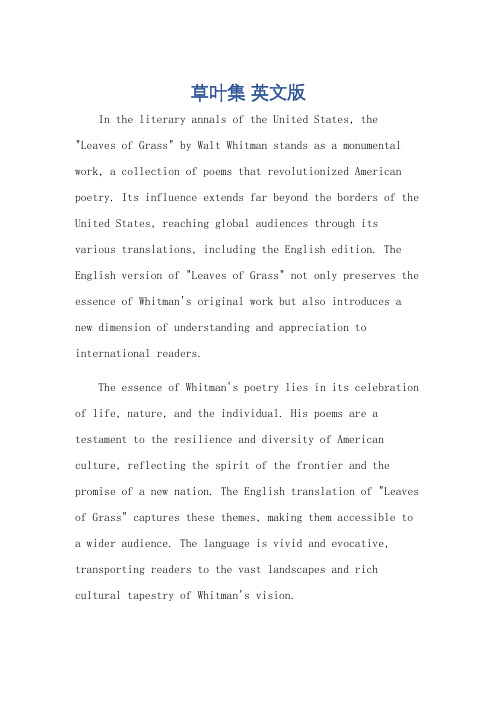
草叶集英文版In the literary annals of the United States, the "Leaves of Grass" by Walt Whitman stands as a monumental work, a collection of poems that revolutionized American poetry. Its influence extends far beyond the borders of the United States, reaching global audiences through its various translations, including the English edition. The English version of "Leaves of Grass" not only preserves the essence of Whitman's original work but also introduces a new dimension of understanding and appreciation to international readers.The essence of Whitman's poetry lies in its celebration of life, nature, and the individual. His poems are a testament to the resilience and diversity of American culture, reflecting the spirit of the frontier and the promise of a new nation. The English translation of "Leaves of Grass" captures these themes, making them accessible to a wider audience. The language is vivid and evocative, transporting readers to the vast landscapes and rich cultural tapestry of Whitman's vision.The translation of "Leaves of Grass" into English was a momentous occasion, marking a significant milestone in the history of literary translation. It was not just alinguistic exercise; it was an act of cultural exchange and understanding. The English edition introduced Whitman's unique voice and perspective to a global audience, sparking interest and debate among scholars and readers alike.The impact of the English version of "Leaves of Grass" is felt in various ways. It has influenced generations of writers and poets, inspiring them to explore new themes and techniques. The work's emphasis on individuality and self-expression has resonated with readers seeking to express their own identities and experiences. The poetry's celebration of nature and the beauty of the world has also been a source of inspiration for environmentalists and conservationists.The English edition of "Leaves of Grass" has also contributed to the global dissemination of American literature. Its popularity abroad has helped shape the perception of American culture and values in international forums. The work's themes and images have become part ofthe global literary canon, influencing writers and thinkers across the globe.In conclusion, the English version of "Leaves of Grass" is not just a translation; it is a bridge between cultures, a medium for understanding and appreciation. It preservesthe essence of Whitman's original work while introducingnew dimensions of meaning and significance to international readers. The influence of this translation is felt in the realm of literature, culture, and global understanding, making it a vital part of the literary landscape.**《草叶集》:英文版之魅力与传播**在美国文学史上,沃尔特·惠特曼的《草叶集》是一部具有里程碑意义的作品,这部诗集革命性地改变了美国诗歌的面貌。
惠特曼的草叶集简介(英文)
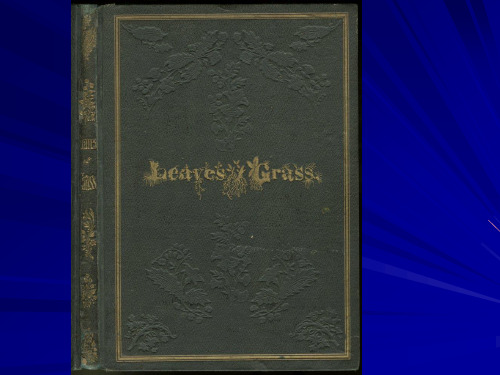
Leaves of Grass: Subjects and Style
Whitman's poetry is democratic in both its subject matter and its language. We see Whitman breaking new ground in both subject matter and diction. Subjects: the new America; himself The stated mission of his poetry was, in his words, to make "[a]n attempt to put a Person, a human being (myself, in the latter half of the 19th century, in America) freely, fully, and truly on record."
Leaves of Grass
The critical and popular response to Leaves of Grass was mixed and bewildered. The majority of the readers who happened to have come upon the book seem to have been simply indifferent.
Leaves of Grass: Subjects and Style
Whitman's great subject was America, but he wrote on an expansive variety of smaller subjects to accomplish the task of capturing the essence of this country. Some of his many subjects included slavery, democracy, the various occupations and types of work, the American landscape, the sea, the natural world, the Civil War, education, aging, death and immortality, poverty, romantic love, spirituality, and social change.
草叶集(中英对照版)第三卷歌唱自我(第四十二节)
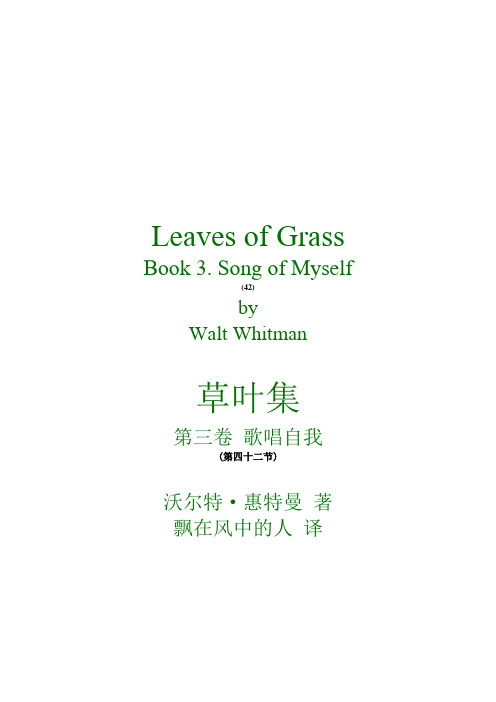
Leaves of Grass Book 3. Song of Myself(42)byWalt Whitman草叶集第三卷歌唱自我(第四十二节)沃尔特·惠特曼著飘在风中的人译LEAVES OF GRASS草之叶Come, said my soul,来吧,我的灵魂说道,Such verses for my Body let us write, (for we are one,)为了我的肉体,让我们写下这些诗,(因为我们是密不可分的整体)That should I after return,这样如果以后我将归来,Or, long, long hence, in other spheres,也许,在很久,很久以后,在另外的星体或空间,There to some group of mates the chants resuming,在那里朝着某一群伙伴,我将把这些颂歌重新颂唱,(Tallyi ng Earth’s soil, trees, winds, tumultuous waves,)(把地球的土壤、树木、风儿和汹涌波浪逐一地清点)Ever with pleas’d smile I may keep on,我会带着喜悦的微笑永不放弃,Ever and ever yet the verses owning—as, first, I here and now永永远远地把这些诗篇拥有——就像此时此刻的我一样,首先,Signing for Soul and Body, set to them my name,为了灵魂和肉体而签下名字,把我的名字嵌在它们上面。
Walt Whitman沃尔特·惠特曼BOOK III第三卷S ONG OF M YSELF (42)歌唱自我(第四十二节)42A call in the midst of the crowd,这是从人丛的中央传出一声呼唤,My own voice, orotund sweeping and final.它是发自我自己的声音,宏大,横扫一切,决定了一切。
《我自己的歌》沃尔特·惠特曼(WaltWhitman)
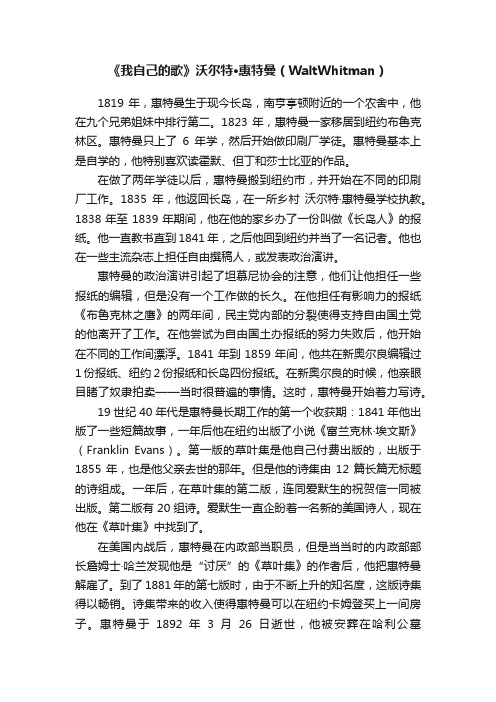
《我自己的歌》沃尔特·惠特曼(WaltWhitman)1819年,惠特曼生于现今长岛,南亨亭顿附近的一个农舍中,他在九个兄弟姐妹中排行第二。
1823年,惠特曼一家移居到纽约布鲁克林区。
惠特曼只上了6年学,然后开始做印刷厂学徒。
惠特曼基本上是自学的,他特别喜欢读霍默、但丁和莎士比亚的作品。
在做了两年学徒以后,惠特曼搬到纽约市,并开始在不同的印刷厂工作。
1835年,他返回长岛,在一所乡村沃尔特·惠特曼学校执教。
1838年至1839年期间,他在他的家乡办了一份叫做《长岛人》的报纸。
他一直教书直到1841年,之后他回到纽约并当了一名记者。
他也在一些主流杂志上担任自由撰稿人,或发表政治演讲。
惠特曼的政治演讲引起了坦慕尼协会的注意,他们让他担任一些报纸的编辑,但是没有一个工作做的长久。
在他担任有影响力的报纸《布鲁克林之鹰》的两年间,民主党内部的分裂使得支持自由国土党的他离开了工作。
在他尝试为自由国土办报纸的努力失败后,他开始在不同的工作间漂浮。
1841年到1859年间,他共在新奥尔良编辑过1份报纸、纽约2份报纸和长岛四份报纸。
在新奥尔良的时候,他亲眼目睹了奴隶拍卖——当时很普遍的事情。
这时,惠特曼开始着力写诗。
19世纪40年代是惠特曼长期工作的第一个收获期:1841年他出版了一些短篇故事,一年后他在纽约出版了小说《富兰克林·埃文斯》(Franklin Evans)。
第一版的草叶集是他自己付费出版的,出版于1855年,也是他父亲去世的那年。
但是他的诗集由12篇长篇无标题的诗组成。
一年后,在草叶集的第二版,连同爱默生的祝贺信一同被出版。
第二版有20组诗。
爱默生一直企盼着一名新的美国诗人,现在他在《草叶集》中找到了。
在美国内战后,惠特曼在内政部当职员,但是当当时的内政部部长詹姆士·哈兰发现他是“讨厌”的《草叶集》的作者后,他把惠特曼解雇了。
到了1881年的第七版时,由于不断上升的知名度,这版诗集得以畅销。
惠特曼的诗歌英文作文

惠特曼的诗歌英文作文英文:Walt Whitman, one of the most influential poets in American literature, is known for his unique style and themes in his poetry. His works often celebrate the beauty of nature, the value of individualism, and the importance of democracy. Whitman's poetry is characterized by free verse, which is a form of poetry that does not follow a specific rhyme or meter. This allows for a more natural and conversational tone in his writing.One of Whitman's most famous works is "Song of Myself," which is a long and complex poem that explores themes of identity, spirituality, and the interconnectedness of all things. In this poem, Whitman uses vivid imagery and unconventional language to convey his ideas. For example, he often uses metaphors and similes to describe the world around him, such as when he describes himself as "a vast similitude interlocks all" (section 1).Another notable aspect of Whitman's poetry is his use of repetition and lists. He often repeats phrases or words to emphasize their importance and create a sense of rhythm in his writing. For example, in "Song of Myself," he repeats the phrase "I celebrate myself" several times throughout the poem (sections 1, 20, and 52). He also uses lists to create a sense of abundance and inclusivity. In section 6 of the same poem, he lists a variety of people and professions, stating that "the butcher-boy puts off his killing-clothes" and "the young fellow drives the express-wagon."Overall, Whitman's poetry is a celebration of life and humanity. His unique style and themes continue to influence poets and writers today.中文:沃尔特·惠特曼是美国文学中最具影响力的诗人之一,以其独特的风格和主题而闻名。
Whitman-惠特曼-作品-介绍-英文版
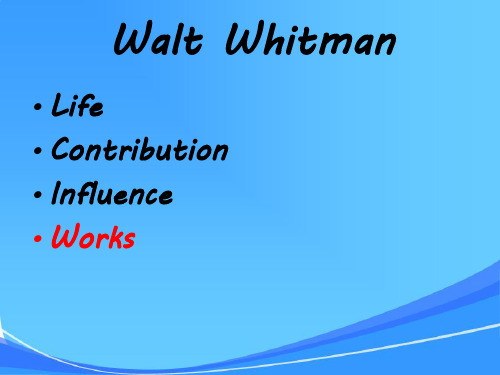
• Contemporary American poetry, whatever school or form, bears witness to his great influence.
• During the Civil War ,Whitman worked as a volunteer nurse.
Life
• Whitman died in 1892 because of his bad health ,he was buried in Harleigh(哈利公 墓).
Life
Contribution
• One of the great innovators in American literature.
• He gave America its first genuine epic poem: Leaves of Grass.
• He created the “ Free verse ” : the verse that does not follow a fixed metrical pattern, the verse without a fixed beat or regular rhyme scheme.
3. Special features
>>. The poem is composed of three octaves, that is, four long lines and four short ones, the latter being used as a refrain.
>>. The meter is iambic and the rhyming scheme is roughly represented as aabb cded.
高中英语Unit10 American literature文章 惠特曼 Walt Whitman人
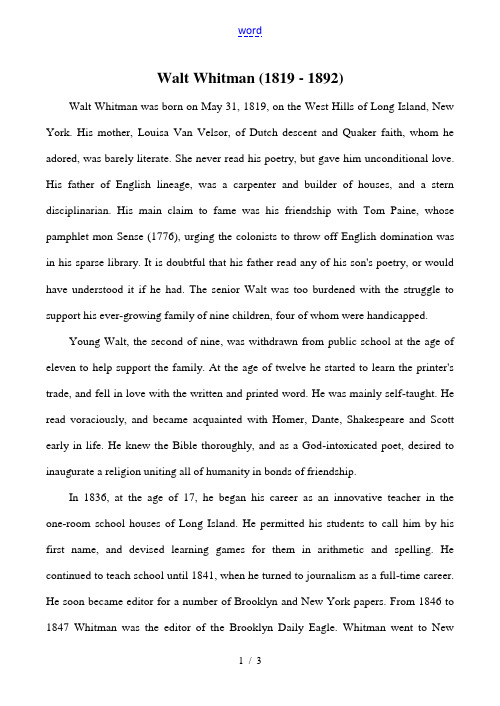
Walt Whitman (1819 - 1892)Walt Whitman was born on May 31, 1819, on the West Hills of Long Island, New York. His mother, Louisa Van Velsor, of Dutch descent and Quaker faith, whom he adored, was barely literate. She never read his poetry, but gave him unconditional love. His father of English lineage, was a carpenter and builder of houses, and a stern disciplinarian. His main claim to fame was his friendship with Tom Paine, whose pamphlet mon Sense (1776), urging the colonists to throw off English domination was in his sparse library. It is doubtful that his father read any of his son's poetry, or would have understood it if he had. The senior Walt was too burdened with the struggle to support his ever-growing family of nine children, four of whom were handicapped.Young Walt, the second of nine, was withdrawn from public school at the age of eleven to help support the family. At the age of twelve he started to learn the printer's trade, and fell in love with the written and printed word. He was mainly self-taught. He read voraciously, and became acquainted with Homer, Dante, Shakespeare and Scott early in life. He knew the Bible thoroughly, and as a God-intoxicated poet, desired to inaugurate a religion uniting all of humanity in bonds of friendship.In 1836, at the age of 17, he began his career as an innovative teacher in the one-room school houses of Long Island. He permitted his students to call him by his first name, and devised learning games for them in arithmetic and spelling. He continued to teach school until 1841, when he turned to journalism as a full-time career. He soon became editor for a number of Brooklyn and New York papers. From 1846 to 1847 Whitman was the editor of the Brooklyn Daily Eagle. Whitman went to NewOrleans in 1848, where he was editor for a brief time of the "New Orleans Crescent". In that city he had bee fascinated with the French language. Many of his poems contain words of French derivation. It was in New Orleans that he experienced at first hand the viciousness of slavery in the slave markets of that city.On his return to Brooklyn in the fall of 1848, he founded a "free soil" newspaper, the "Brooklyn Freeman". Between 1848 and 1855 he developed the style of poetry that so astonished Ralph Waldo Emerson. When the poet's Leaves Of Grass reached him as a gift in July, 1855, the Dean of American Letters thanked him for "the wonderful gift" and said that he rubbed his eyes a little "to see if the sunbeam was no illusion." Walt Whitman had been unknown to Emerson prior to that occasion. The "sunbeam" that illuminated a great deal of Whitman's poetry was Music. It was one of the major sources of his inspiration. Many of his four hundred poems contain musical terms, names of instruments, and names of posers. He insisted that music was "greater than wealth, greater than buildings, ships, religions, paintings." In his final essay written one year before his death in 1891, he sums up his struggles of thirty years to write Leaves of Grass. The opening paragraph of his self-evaluation "A Backward Glance O'er Travel'd Road," begins with his reminiscences of "the best of songs heard." His concluding ments again return to thoughts about music, saying that "the strongest and sweetest songs remain yet to be sung.""When Lilacs Last in the Dooryard Bloomed" and "O Captain! My Captain!" (1866) are two of his more famous poems. A poet who was ardently singing on life and himself, Whitman is today claimed as one of the few truly great American men of letters.。
诗人惠特曼的简介
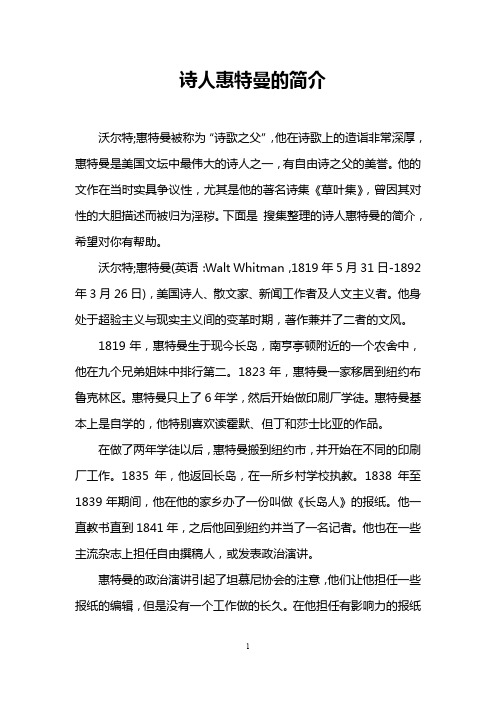
诗人惠特曼的简介沃尔特;惠特曼被称为“诗歌之父”,他在诗歌上的造诣非常深厚,惠特曼是美国文坛中最伟大的诗人之一,有自由诗之父的美誉。
他的文作在当时实具争议性,尤其是他的著名诗集《草叶集》,曾因其对性的大胆描述而被归为淫秽。
下面是搜集整理的诗人惠特曼的简介,希望对你有帮助。
沃尔特;惠特曼(英语:Walt Whitman,1819年5月31日-1892年3月26日),美国诗人、散文家、新闻工作者及人文主义者。
他身处于超验主义与现实主义间的变革时期,著作兼并了二者的文风。
1819年,惠特曼生于现今长岛,南亨亭顿附近的一个农舍中,他在九个兄弟姐妹中排行第二。
1823年,惠特曼一家移居到纽约布鲁克林区。
惠特曼只上了6年学,然后开始做印刷厂学徒。
惠特曼基本上是自学的,他特别喜欢读霍默、但丁和莎士比亚的作品。
在做了两年学徒以后,惠特曼搬到纽约市,并开始在不同的印刷厂工作。
1835年,他返回长岛,在一所乡村学校执教。
1838年至1839年期间,他在他的家乡办了一份叫做《长岛人》的报纸。
他一直教书直到1841年,之后他回到纽约并当了一名记者。
他也在一些主流杂志上担任自由撰稿人,或发表政治演讲。
惠特曼的政治演讲引起了坦慕尼协会的注意,他们让他担任一些报纸的编辑,但是没有一个工作做的长久。
在他担任有影响力的报纸《布鲁克林之鹰》的两年间,民主党内部的分裂使得支持自由国土党的他离开了工作。
在他尝试为自由国土办报纸的努力失败后,他开始在不同的工作间漂浮。
1841年到1859年间,他共在新奥尔良编辑过1份报纸、纽约2份报纸和长岛四份报纸。
在新奥尔良的时候,他亲眼目睹了奴隶拍卖;;当时很普遍的事情。
这时,惠特曼开始着力写诗。
19世纪40年代是惠特曼长期工作的第一个收获期:1841年他出版了一些短篇故事,一年后他在纽约出版了小说《富兰克林;埃文斯》(Franklin Evans)。
第一版的草叶集是他自己付费出版的,出版于1855年,也是他父亲去世的那年。
- 1、下载文档前请自行甄别文档内容的完整性,平台不提供额外的编辑、内容补充、找答案等附加服务。
- 2、"仅部分预览"的文档,不可在线预览部分如存在完整性等问题,可反馈申请退款(可完整预览的文档不适用该条件!)。
- 3、如文档侵犯您的权益,请联系客服反馈,我们会尽快为您处理(人工客服工作时间:9:00-18:30)。
Life
Contribution
• One of the great innovators in American literature.
• He gave America its first genuine epic poem: Leaves of Grass.
• He created the “ Free verse ” : the verse that does not follow a fixed metrical pattern, the verse without a fixed beat or regular rhyme scheme.
The Themes in his poetry
• Equality • Divinity • Multiplicity • Self-reliant spirit • Death ,beauty of death • Expansion of America • Brotherhood and social solidarity • Pursuit of love and happiness
2. Themes
This poem eulogizes Lincoln’s monumental contributions and expresses the poet’s mourning for Lincoln’s death with the background of the victory of the Civil War.
3. Special features
>>. The poem is composed of three octaves, that is, four long lines and four short ones, the latter being used as a refrain.
>>. The meter is iambic and the rhyming scheme is roughly represented as aabb cded.
Walt Whitman
1819-1892
英本五班 张丹 1003150120
Walt Whitman
• Life • Contribution • Influence • Works
Life
• Walter Whitman was born in 1819 in Long Island ,the second son of a house-builder.
O Captain! My Captain!
Analysis of O Captain! My Captain!
1.Background
2.Theme
3.Special Features
4.My Understanding
1. Background
At the end of the Civil War in 1865, Abraham Lincoln, the symbol of democracy and progress, was assassinated by the obstinate slave owners of the south states. Lincoln’s death shocked the whole country. The democratic poet Walt Whitman wrote the poetry collection Elegy Collect (including O Captain! My Captain! and When Lilacs Last in the Dooryard Bloom’d) to eulogize the beloved president, to confide his own sorrow at the death of the president. The abolishment of slavery is not only the progress of the American, but of the humankind. Then Lincoln’s death is not only the sorrow of the American, but of the humankind. Therefore, Whitman revealed the grief of his own, of the American, of all the humankind.
Influence
• Through him, American poets finally freed themselves from the old English traditions.
• His best work has become part of the common property of Western culture.
>>. Oral English is also applied in his free verse to make it an effective way to express freely the feelings of common people.
4.My Understanding
O Captain!My Captain! O Captain!My Captain!Our fearful trip is done. The ship has weathered every rack, the prize we sought is won, The port is near, the bells I hear, the people all exulting, While follow eyes the steady keel, the vessel grim and daring;
• He has been compared to a mountain in American literary history.
• Contemporary American poetry, whatever school or form, bears witness to his great influence.
Envelop structure :
Often in Whitman’s poetry , the first line begins with the subject ,and then more and more lines list modifiers till the verb appears in the last line of the stanza .This is like enclosing a whole list of ideas in an envelop .
>>. Phonetic recurrence is the main feature of the poem, i.e., the systematic repetition of words and phrases at the beginning of the line, in the middle or at the end.
• Largely self-taught, he read voraciously, becoming acquainted with the works of Homer, Dante, Shakespeare, and the B fall of 1848, he founded a “Free Soil" newspaper, the Brooklyn Freeman, and continued to develop the unique style of poetry.
In the poem Walt Whitman uses writing skills of symbol, imagery, and repetition to get a wonderful effect of art. This makes readers enjoy a unique beauty of art from vision,hearing, language and metre.
Leaves of Grass
Free verse :
A kind of poetry that does not conform to consistent meter patterns ,rhyme (The line is the rhythmical unit as in the poetry of English bible).
Works
• Mainly works • Leaves of Grass • O Captain! My Captain!
Mainly works
• Leaves of Grass • Song of Myself • I hear America singing • Out of the Cradle Endlessly Rocking • Drum Taps • O Captain! My Captain!
• In 1855, Whitman took out a copyright on the first edition of Leaves of Grass.
• During the Civil War ,Whitman worked as a volunteer nurse.
Life
• Whitman died in 1892 because of his bad health ,he was buried in Harleigh(哈利公 墓).
This arm beneath your head; It is some dream that on the deck,
